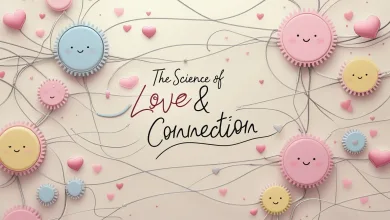Deep Questions to Ask Your Partner

In a world of digital distractions and busy schedules, truly connecting with your partner requires intentionality. These deep questions to ask your partner will help you move beyond surface-level conversations and discover new dimensions of the person you love.
Why Deep Questions Matter in Relationships
We’ve all been there—sitting across from our partner at dinner, asking the standard “How was your day?” and receiving the equally standard “Fine.” Then silence. Not exactly the recipe for profound connection, is it?
The truth is, routine can be the silent killer of intimacy. When we fall into conversational habits that barely scratch the surface, we miss opportunities to really know the person we’re sharing our life with. According to relationship expert Dr. John Gottman, couples who ask open-ended questions and show genuine curiosity about each other’s inner world are significantly more likely to maintain relationship satisfaction over time. It’s not just about talking more—it’s about talking better.
Deep questions create a safe space for vulnerability, which is the cornerstone of emotional intimacy. They signal to your partner that you care about their thoughts, dreams, fears, and experiences—not just what they did today. As Dr. Brené Brown’s research has shown, this kind of vulnerability is actually the birthplace of connection and joy in our relationships.
Setting the Stage for Meaningful Conversations
Before diving into heavy questions, it’s important to create the right environment. Timing and setting matter—a lot!
When you’re both exhausted from work or distracted by the kids running around, it’s probably not the ideal moment to ask about your partner’s greatest existential fears. Instead, look for natural opportunities when you’re both relaxed and present. Maybe it’s during a weekend morning coffee ritual, a long drive, or after the house has quieted down for the evening.
Here are some tips for creating a conducive atmosphere:
- Put the phones away (seriously, in another room if possible)
- Make eye contact and practice active listening
- Respond with genuine curiosity rather than judgment
- Be patient with silences—sometimes the best answers come after a thoughtful pause
- Express gratitude when your partner shares something vulnerable
Remember, this isn’t an interrogation. The goal isn’t to rapidly fire off questions but to genuinely explore each other’s inner worlds. Sometimes one good question can lead to an hour of meaningful conversation.
Questions About Childhood and Personal History
Our past shapes who we are today in countless ways. Understanding your partner’s formative experiences can provide invaluable insight into their current behaviors, values, and triggers. These questions help you explore the roots of your partner’s identity:
- “What’s a memory from your childhood that still makes you smile?”
- “Was there a moment when you felt your parents were genuinely proud of you? How did it affect you?”
- “What’s something you wished for as a child that you never told anyone about?”
- “How do you think your relationship with your parents has shaped how you approach our relationship?”
- “What’s a tradition from your family that you’d like to carry forward (or definitely leave behind)?”
These questions often reveal the origins of your partner’s attachment style, which psychologists like Dr. Sue Johnson identify as crucial to understanding adult relationships. According to Johnson’s Emotionally Focused Therapy research, our early experiences of love and security directly impact how we connect with romantic partners.
When discussing childhood, be especially gentle. These conversations can bring up both beautiful memories and painful wounds. If your partner seems hesitant to explore certain areas, respect their boundaries while letting them know you’re there when they’re ready to share.
Questions About Values and Beliefs
Understanding what matters most to your partner provides a roadmap for navigating life’s big decisions together. Values-based questions help you identify areas of alignment and potential growth:
- “Outside of our relationship, what gives your life the most meaning right now?”
- “Has your definition of success changed over time? How?”
- “What’s a belief you held strongly in the past that you’ve since questioned or changed?”
- “If you could solve one global problem, which would you choose and why?”
- “What kind of legacy do you hope to leave behind someday?”
Research from the Gottman Institute suggests that sharing life dreams and supporting each other’s aspirations is a key predictor of relationship longevity. These questions help you understand what drives your partner at the deepest level.
Values conversations can sometimes reveal differences between you. That’s actually a good thing! The goal isn’t perfect alignment but mutual understanding and respect. When differences emerge, get curious rather than defensive. Ask follow-up questions to understand the experiences and reasoning behind their perspective.
Questions About Fears and Vulnerabilities
Creating space for sharing fears is perhaps the most powerful way to deepen trust. When someone reveals what scares them, they’re essentially saying, “I trust you enough to not use this against me.” These questions open the door to that kind of vulnerable exchange:
- “What’s something that terrifies you that you don’t think most people worry about?”
- “Is there a pattern in relationships you’ve noticed yourself repeating that you’d like to change?”
- “What’s your biggest fear about our relationship specifically?”
- “When do you feel most insecure, and what helps you feel secure again?”
- “What’s something you need from me that you’ve been afraid to ask for?”
Vulnerability researcher Dr. Brené Brown explains that sharing our fears and imperfections actually strengthens connection rather than weakening it. When both partners can be authentic about their struggles, the relationship becomes a true safe haven.
A word of caution: when your partner shares vulnerabilities, avoid the temptation to immediately problem-solve or minimize their feelings. Responses like “That’s not something you should worry about” or “Just look on the bright side” can shut down openness. Instead, validate their experience with empathy: “That makes sense why you’d feel that way” or “Thank you for trusting me with this.”
Questions About Dreams and Aspirations
Dreams reveal what inspires and motivates your partner. These forward-looking questions help you understand their hopes and how you might support them:
- “If money and practicality weren’t concerns, what would you be doing with your life?”
- “What’s something you’ve always wanted to learn or master?”
- “How do you envision our life together in 10 years?”
- “What’s a goal you have that you haven’t shared with many people?”
- “Is there a place in the world that calls to you that we haven’t visited yet?”
According to research on The Psychology of Optimal Experience by Mihaly Csikszentmihalyi, people are happiest when pursuing meaningful goals that challenge them. Understanding each other’s aspirations allows you to be active supporters in each other’s growth journeys.
Dreams can change over time, which is why these conversations are worth revisiting periodically. The partner you met five years ago might have new inspirations today. Regular check-ins about aspirations keep you connected to each other’s evolving sense of purpose.
Questions About Your Relationship
Direct questions about your partnership create opportunities for appreciation, clarification, and growth:
- “What moment in our relationship are you most proud of?”
- “When do you feel most loved by me?”
- “Is there something I do that makes you feel misunderstood?”
- “What’s a strength in our relationship that you think we sometimes take for granted?”
- “How has being with me changed you, for better or worse?”
Relationship researcher Dr. John Gottman found that couples who regularly discuss the state of their relationship—what he calls “The State of the Union” conversations—are better equipped to navigate challenges when they arise.
These questions should be asked with genuine curiosity, not as setups for criticism or complaints. If concerns do emerge, focus on understanding each other first before jumping to solutions. And remember to balance exploration of challenges with acknowledgment of strengths—relationships thrive when positivity outweighs negativity.
Philosophical and Hypothetical Questions
Sometimes the deepest insights come from questions that seem playful or abstract. These conversation starters can reveal values and preferences in surprising ways:
- “If you could give everyone in the world one quality or virtue, what would it be?”
- “Would you rather have a life of exciting adventures or peaceful contentment?”
- “If you could have dinner with anyone, living or dead, who would you choose and what would you ask them?”
- “How would you spend your time if you knew you had one year left to live?”
- “Do you think people are fundamentally good, or do you think goodness is something we have to work at?”
These seemingly lighthearted questions often lead to profound insights about your partner’s worldview. As philosopher Alain de Botton points out in his work on romantic philosophy, understanding how your partner makes sense of the big questions in life is essential for true compatibility.
Don’t rush through these questions. The most interesting part is often not the initial answer but the reasoning behind it. Follow up with “What makes you say that?” or “Tell me more about why you feel that way” to explore the depths of their thinking.
Questions for Rekindling Connection
If you’ve been together for years, these questions can help reignite curiosity and discover new dimensions of each other:
- “What’s something you’ve been thinking about lately that we haven’t discussed?”
- “Is there a side of yourself you don’t think I get to see very often?”
- “What’s something new you’ve learned about yourself in the past year?”
- “What memory of us makes you happiest?”
- “How have your priorities changed since we first met?”
Research on long-term relationships shows that maintaining curiosity and novelty is key to sustaining romance. Even long-married couples can discover new layers to each other when they ask the right questions.
These reconnection questions work best when incorporated into regular rituals—perhaps a monthly date night or weekend getaway specifically for deeper conversations. Protecting time for these discussions signals that your relationship remains a priority despite life’s many demands.
FAQs About Deep Questions in Relationships
How often should we have these deep conversations?
There’s no universal prescription, but research suggests that successful couples regularly make time for meaningful connection. This doesn’t mean every conversation needs to be profound, but aim for at least one deeper discussion each week. Quality matters more than quantity—a genuine 30-minute conversation will do more for your relationship than hours of distracted chatter.
What if my partner isn’t naturally talkative or introspective?
Start small and be patient. Some people need more time to process internal experiences before sharing them. Try giving them the question in advance or suggesting you both write responses first, then discuss. Respect different communication styles—some people express depth through actions rather than words.
What if these questions bring up conflict?
That’s actually normal and potentially healthy! As relationship expert Esther Perel points out, conflict is often where the most important growth happens. The key is how you navigate disagreement. Focus on understanding before resolution, validate feelings even when perspectives differ, and remember you’re on the same team.
What if I’m afraid of being judged for my answers?
Start by discussing this fear openly. Establish ground rules that create safety: no dismissing each other’s feelings, no using vulnerabilities against each other later, and permission to say “I’m not ready to discuss that yet” when needed. Trust builds gradually through consistent emotional safety.
Final Thoughts: The Ongoing Journey of Discovery
The beauty of deep questions isn’t just in asking them once, but in returning to them as you both evolve. The partner sitting across from you today isn’t exactly the same person you met years ago—and that’s wonderful! Growth and change create endless opportunities for discovery.
Consider creating a ritual around these conversations. Perhaps you have a special journal where you record meaningful exchanges, or a yearly tradition of revisiting certain questions on your anniversary. These practices transform deep questions from occasional events into an ongoing practice of connection.
Remember that vulnerability tends to be reciprocal. By opening up first, you create space for your partner to do the same. As researcher Brené Brown wisely notes, “Vulnerability sounds like truth and feels like courage.” In a world that often encourages us to present polished, perfect versions of ourselves, the courage to be real with your partner is perhaps the greatest gift you can offer.
The questions in this article aren’t exhaustive—they’re starting points for your own journey of discovery. The most meaningful questions will be those that emerge organically from your unique relationship. Stay curious, listen deeply, and enjoy the lifelong adventure of truly knowing each other.






